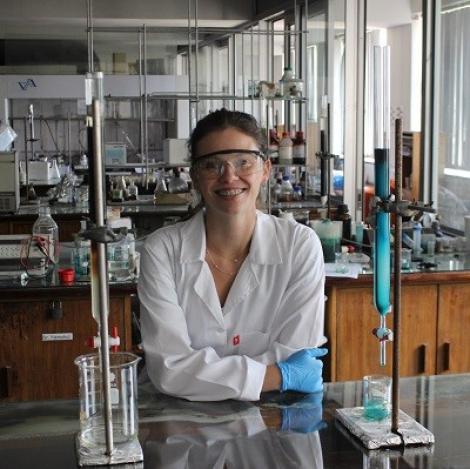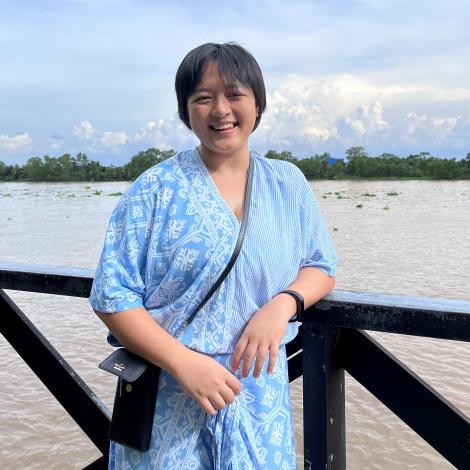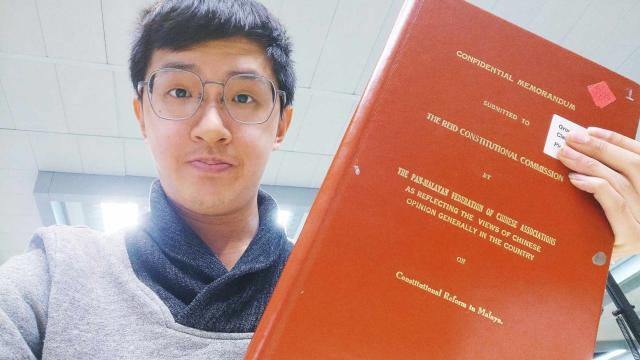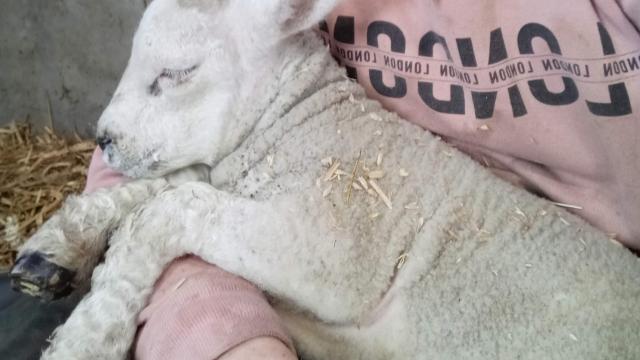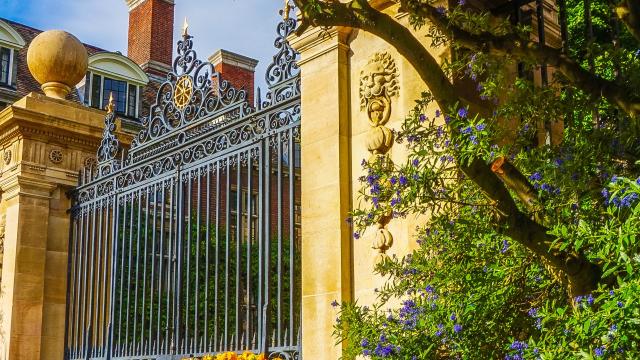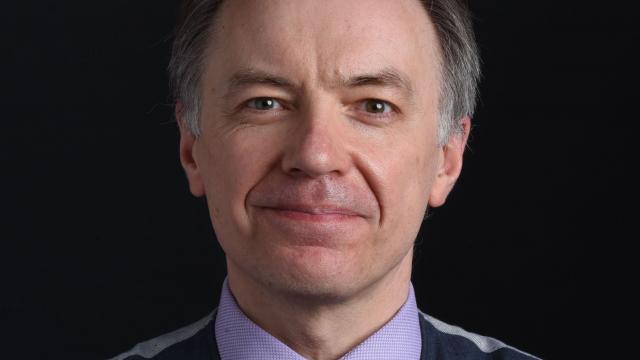
St Catharine’s is delighted to be welcoming two new Gates Cambridge Scholars who will be joining as postgraduate members of the College at the start of the new academic year: Kristen Burgess will be studying for a PhD in Chemistry and Dien Min Loong will be joining the World History MPhil programme. They join a thriving community of Gates Cambridge Scholars based at St Catharine’s following the admission of one Scholar in 2021 and a group of four in 2022.
The Gates Cambridge Scholarship programme was established in 2000 by a donation of US$210 million from the Bill and Melinda Gates Foundation to the University of Cambridge; this remains the largest single donation to a UK university. The programme continues to offer approximately 80 full-cost scholarships each year to outstanding applicants from countries outside the UK to pursue a postgraduate degree in any subject available at the University of Cambridge.
Professor Eilís Ferran (1980, Law; Fellow 1987), Provost for the Gates Cambridge Trust, welcomed the 2023 cohort of Gates Cambridge Scholars by saying:
“These scholars, who have been selected by our expert Selection Panels, reflect the mission of the Gates Cambridge Trust established through the Bill and Melinda Gates Foundation’s generous and historic gift to the University of Cambridge. Like their predecessors, they are both intellectually outstanding and demonstrate the kind of leadership qualities needed to tackle the complex global challenges we face today. We know that these scholars will flourish in the rich, international community at Cambridge and will go on to make a significant impact in their fields and to the wider global community.”
Read on to find out more about Kristen and Loong, and the family connections that have inspired their postgraduate studies.
Kristen Burgess
Born in Johannesburg in South Africa, Kristen is looking forward to being part of St Catharine’s:
“Despite growing up in a big city, I have gravitated more towards small, close-knit communities as I got older, even turning down an opportunity in London because I knew it wouldn’t suit me. I particularly enjoyed my junior high school years in the smaller town of Makhanda (also known as Grahamstown) in the Eastern Cape and have been very happy at Rhodes University, a small university in the same town.”
For much of her life, Kristen was an avid ballet dancer and was preparing for the Royal Academy of Dance’s Advance 2 examinations when she decided to stop training:
“I knew deep-down that I had to sacrifice either dance or science, and decided to dedicate myself to science. Progressing to an academic standard that meant I could secure a fully-funded place at Cambridge has been a long process, with lots of blood, sweat and tears along the way, but it has definitely been worth the wait – there is no way I could afford a PhD at Cambridge without the support of the Gates Cambridge Trust. The journey not only taught me resilience but also reinforced my passion for science, as I’ve been tutoring high school science students alongside my own studies.”
Kristen’s PhD at Cambridge’s Yusuf Hamied Department of Chemistry will involve studying the chemistry and biochemistry of brain tumours:
“After my undergraduate degree, I needed to decide between chemistry and biochemistry for my postgraduate endeavours; even though I love biochemistry, I opted for chemistry, as it allowed me to explore diseases (and other topics) with a molecular approach and left a few more doors open. Over the course of my undergraduate degree and postgraduate research, this interest has been ignited and has ultimately developed into an insatiable hunger to understand more.
“I will now be doing my PhD with a broader focus encompassing both chemistry and biochemistry. This project will investigate the effect that Glioblastoma Multiforme (malignant brain tumours) has on the surrounding extracellular matrix within brain tissue, in order to enhance its progression and invasion. Once the mechanism of the disease has been mapped out, an intelligent molecular intervention can be designed.”
Kristen has always been interested in the underlying mechanisms of disease, particularly cancer., but recent events in her family have given her studies more meaning:
“My sister was diagnosed with stage 4 thyroid cancer two years ago, which has made the quest to understand cancer in all its forms and develop effective new treatments all the more important for me. My family has been incredibly lucky that my sister is now in remission and healthy enough to emigrate to New Zealand, and I am just delighted that this PhD will harness my scientific interests to combat cancer and hopefully benefit patients in the future.”
Away from the lab, Kristen enjoys reading, watching documentaries and starting to learn how to golf.
Dien Min Loong
Loong is joining St Catharine’s as a MPhil Candidate in World History after completing her undergraduate studies in International Relations with French at the University of Nottingham Malaysia (UNM). Since 2022, she worked as a research assistant on projects that covered different periods and aspects of Malayan/Malaysian history under Professor Crispin Nicholas Bates, Professor of Modern and Contemporary South Asian History at the University of Edinburgh; Sudarshana Chanda, a History PhD candidate at Harvard University; and Sim Chi Yin, Nobel Peace Prize Photographer 2017. She is currently working with Matthew Koo, a doctoral student in Political Science at Yale University.
She explains, “I have lived my whole life in Malaysia. Understandably, the decision to apply to Cambridge was not taken lightly. I remembered when my mentor from UNM, Professor Sumit Mandal, first told me about the MPhil in World History programme at Cambridge and the Tunku Scholarship, a funding opportunity that appealed to me immensely given my financial background. However, I had many doubts and dared not dream of getting into the programme, let alone with a full scholarship from the Gates Cambridge Trust. Only when I realised that one of our school’s alumna, Netusha Naidu (2018, History), was a Tunku Scholar at Catz did I begin to consider the possibility of applying.”
In late 2021, Loong applied for an internship at Imagined Malaysia, a non-profit that aims to advance the study of Southeast Asian – and specifically, Malaysian – history, by providing a platform to learn and critically discuss alternative historical narratives. Through Netusha, who is the President of Imagined Malaysia, Loong learnt more about Catz and its history of cultivating Malay World specialists through the Tunku research community. Loong explains how this internship also helped develop the ideas she will be exploring in her MPhil in World Studies at Cambridge:
“It started with pure curiosity. I was digging through old family letters and found out that my late grandfather, a first-generation Hainanese in Malaya challenged much of the pervasive gender norms at the time by ensuring that his daughters had equal opportunities for education. As my family has always been an avid proponent of Confucianism, it was intriguing to learn that my grandfather had unknowingly defied the same stereotypical Confucian values that he so strictly taught us. It only occurred to me that many first-generation diasporas in Malaya negotiated their identity in similarly unique ways when I joined Imagined Malaysia. In a project entitled “#TanpaPerkauman: The Road to Discrimination-Free Malaysia”, I further interrogated the nationalistic narratives that I internalised through my Malaysian public-school education.
“Since then, I have been attentive to the subtle, nuanced and complex ways that Malaysians navigate and interact with a place where racialisation pervades every corner of our lives. My MPhil project will study how colonial subjects participated in the making and remaking of sexual and gender norms in contemporary Malaysia and Singapore through engaging with British Malaya’s incoherent legal regime that disciplined sexuality. By looking at intimacies between diasporas in their lived experience, I hope to substantiate and rethink body politics beyond reductionist understandings of race and sexuality, especially when the rights of local queer communities are now politically charged battlegrounds for state, religious, legal, cultural and moral narratives in Malaysia.”
Aside from her studies, Loong is looking forward to resuming some of her extracurricular interests when she arrives at St Catharine’s, including weightlifting, rock climbing and performing music (she plays the piano, clarinet and also conducts).
